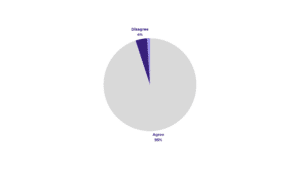In the field of home visiting, leadership isn’t just about steering a team; it’s about fostering a culture of empathy, growth, and inclusivity. A recent project led by Start Early, Leadership Pathways for Home Visitors of Color: An Exploration, sheds light on the successes and barriers that Black, Indigenous, and People of Color (BIPOC) home visitors face when striving for leadership opportunities. The project features the voices of two BIPOC home visitors who served as leaders on this work, Clare Willamson, Home Visitor/Parent Educator at Georgetown University Parenting Support Program, and Claudette Kabera, Family Case Manager at Community of Hope. Through the lens of their experiences, we explore what it truly means to be a leader in this field.
Effective Leadership to Empower BIPOC Home Visitors
Effective leadership in home visiting requires more than just managerial skills; it demands a profound understanding of the challenges faced by both families and team members. Clare emphasized the importance of empathy, transparency, and openness to feedback:
“It’s always great to feel like your supervisor is open to learning things from you because it creates trust on both ends.” – Clare Williamson
Having firsthand experience working with families allows leaders to establish a genuine connection and offer meaningful support to supervisees. Claudette highlighted the significance of shared experiences, advocating for leaders who have walked the same path as their team members:
“The best manager I ever had, was a home visitor before they became a manager. I always felt like they knew what we were going through and was our biggest champion.” – Claudette Kabera
It is crucial for leaders to be committed to continuous learning and growth, and to foster diversity within their leadership teams. By investing in the advancement of BIPOC home visitors into leadership roles, organizations can create pathways for greater representation and inclusivity.
“As a leader it’s important to know your community, and if you don’t know your community, be open to learning about it!” – Claudette Kabera
Transformation of Professional Identity
As leaders within the Leadership Pathways Project, Clare and Claudette found themselves in an environment where they felt valued and supported. This collaborative venture not only bolstered their confidence but also instilled a deep appreciation for the contributions of BIPOC home visitors.
“It was refreshing to have a whole team backing this project, and us, every step of the way. Sometimes, it felt like they saw our potential before we did. Being part of this project has made me more confident and made me appreciate BIPOC home visitors and all the work that they do.” – Claudette Kabera
Being part of such a transformative project not only enhanced their professional skills but also shaped their personal and professional identities. It fostered a sense of belonging and empowerment, affirmed their values as home visitors, and equipped them with insights into their potential as leaders.
“This was my first time being a part of a project like this. The consistent encouragement e.g. “you got this” or “you’re great” made me feel a sense of belonging, but also made me feel like they trusted me to do the work. And I think that’s huge!” – Clare Williamson
In essence, leadership in home visiting transcends traditional managerial roles. It’s about fostering a culture of understanding, support, and empowerment, where every team member feels valued and heard. Through their journey within the Leadership Pathways Project, Clare and Claudette exemplify the transformative power of leadership in nurturing a brighter future for BIPOC home visitors and the families they serve.
For BIPOC home visiting professionals aspiring to cultivate leadership abilities, Clare and Claudette offer practical advice. They stress the significance of self-belief, seeking mentorship, and expressing interest in leadership positions. By recognizing their own potential and actively pursuing opportunities for growth, individuals can embark on a journey towards leadership with confidence and determination.
To learn more about the Leadership Pathways project and the takeaways from this work, click here.
This blog post was co-authored by Clare Williamson (Home Visitor/Parent Educator, Georgetown University Parenting Support Program) and Claudette Kabera (Family Case Manager, Community of Hope).


